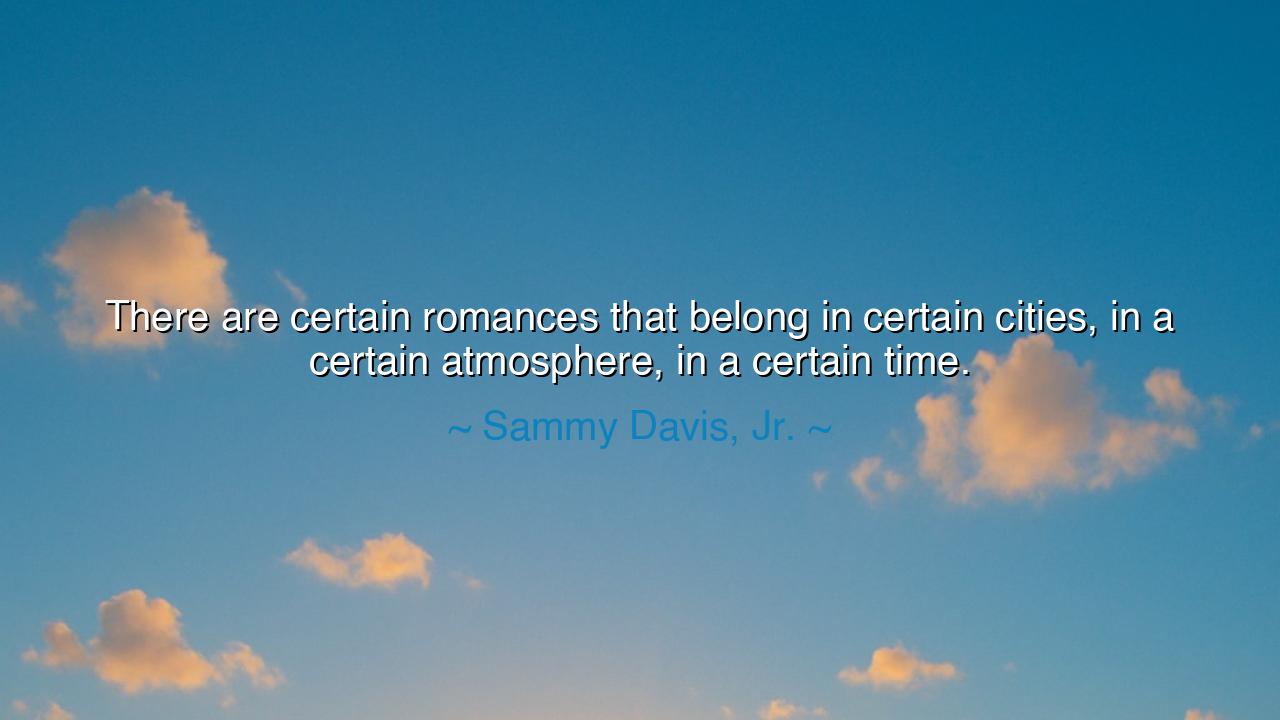
There are certain romances that belong in certain cities, in a
There are certain romances that belong in certain cities, in a certain atmosphere, in a certain time.






“There are certain romances that belong in certain cities, in a certain atmosphere, in a certain time.” Thus spoke Sammy Davis, Jr., a man who lived his life on the stage and in the whirlwind of changing eras. His words remind us that romance is not only the union of two souls, but also the union of place, season, and circumstance. For love, like a song, is shaped by the hall in which it is sung; its echo is determined not by passion alone, but by the world around it.
To say that a romance “belongs” to a particular city or time is to acknowledge that love is woven into the fabric of history and geography. A walk through the narrow streets of Venice, lit by lanterns reflecting on still canals, inspires a different spirit than a hurried conversation in the noise of New York. To sit beneath the cherry blossoms of Kyoto is not the same as to linger in the cafés of Paris. Love is eternal in essence, but its expression is shaped by the world in which it breathes.
The ancients themselves testified to this truth. Consider Antony and Cleopatra, whose love could not have been born in a quiet village or simple household. It belonged to the opulent palaces of Alexandria, to the clash of empires, to the atmosphere of grandeur and peril. Their romance was inseparable from the time and place in which it lived. Remove it from that stage, and it would cease to be itself. Just so, Sammy Davis, Jr. reminds us that some loves only make sense within the magic of their context.
We may also recall the story of Héloïse and Abélard in medieval Paris. Their letters burn with passion, philosophy, and pain, but their love was inseparable from the cloisters and schools of their age. In another century, their union might have been ordinary, unnoticed. But in that atmosphere of faith and learning, their romance became both tragic and immortal. It was their city, their time, that gave shape and depth to their love.
What Davis teaches us is both beautiful and sobering. Love is not entirely under our command; it is also the child of destiny. We do not choose the time, nor the place, nor the atmosphere in which love strikes. Sometimes it blossoms only in the brief intersection of circumstances—two souls crossing in the right city, under the right sky, in the fleeting moment when both are free to embrace. To try and transplant such a romance elsewhere is to find it wilt, for it belonged to that moment alone.
Yet this is not cause for despair, but for reverence. For it means that love is not only personal—it is cosmic. Each romance is a thread woven not only between hearts, but into the larger tapestry of time and space. The wise do not mourn when such romances pass, for they understand they were sacred precisely because they were bound to their moment. Their beauty lies in their belonging.
Therefore, dear seeker, take this teaching to heart: cherish the romances of time and place. Do not measure them only by how long they last, but by how deeply they belong to their moment. If love comes to you in a certain city, in a fleeting season, embrace it fully, without fear of its impermanence. For some loves are eternal in memory, even if brief in life. And to live such a romance is to taste eternity in an hour, to carry the music of that place and time forever in the heart.






AAdministratorAdministrator
Welcome, honored guests. Please leave a comment, we will respond soon